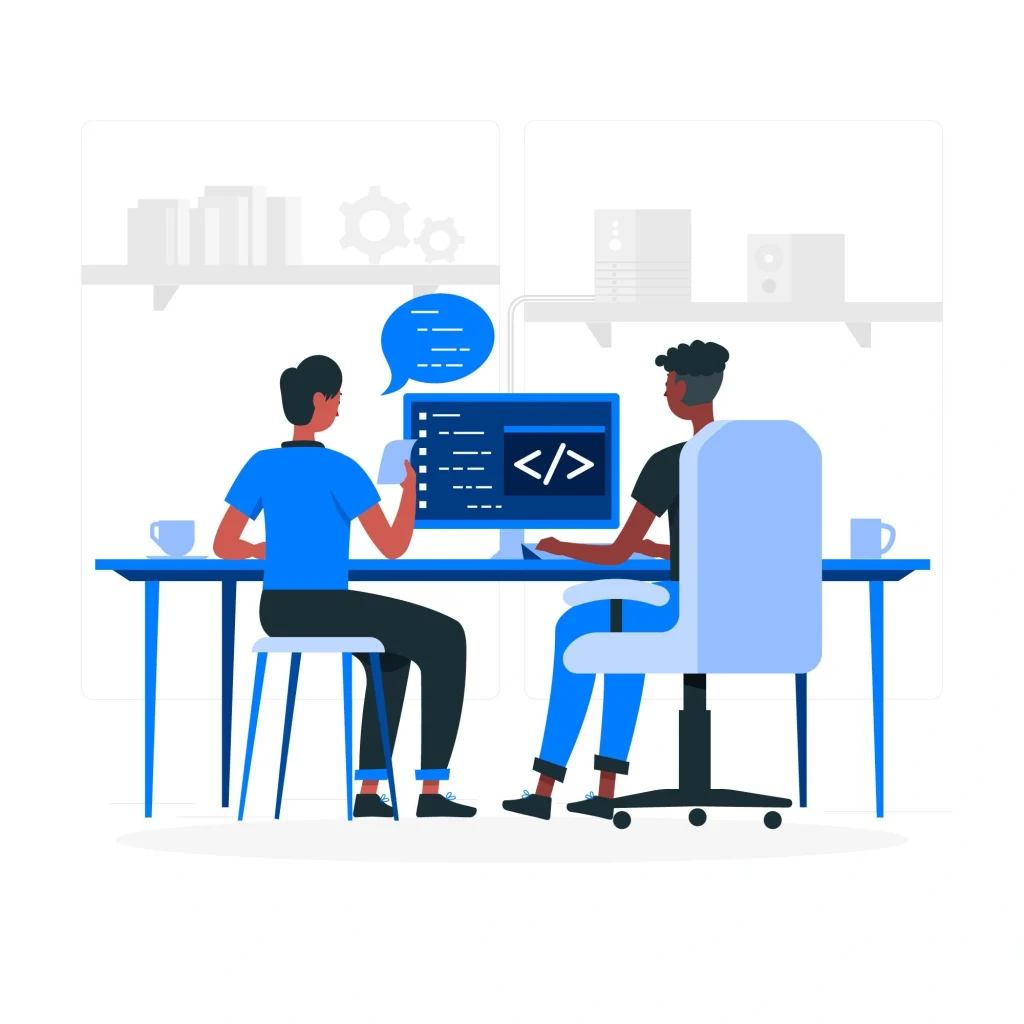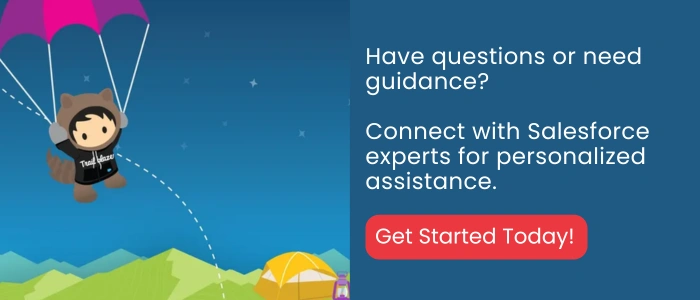Salesforce CPQ (formerly, Steelbrick CPQ) can be your game-changer. But to unlock its full potential, you need the right Salesforce CPQ developer on your team.
So, we’re here as your guide to help you hire the best CPQ developer to fulfil your business needs. Eliminate the inefficient quoting process which is slowing down your sales deals.
So, let’s start with the basics by defining the roles and responsibilities of Salesforce CPQ developers.
Table of Contents
Who are Salesforce CPQ Developers? Roles and Responsibilities
A Salesforce CPQ developer is a coding whiz who builds custom solutions within the Salesforce CPQ platform. They bridge the gap between your unique quoting needs and an automated, streamlined quoting system, ensuring accurate and efficient quotes for your sales team.
Roles of CPQ Specialist
- Configure the Salesforce CPQ platform to match your specific quoting process, product structures, and pricing models.
- Ensure your product information is accurate, up-to-date, and readily available for generating quotes.
- Define and automate complex pricing rules based on volume discounts, product combinations, and customer segments.
- Streamline the quoting process for your sales team, enabling quick and error-free quote generation.
- Design efficient approval workflows to guarantee timely quote approvals without delays.
- Automate contract generation from approved quotes and integrate contract management with existing workflows.
- Utilize tools like workflows, process builders, and triggers to automate tasks further and boost overall efficiency.
- Develop custom user interfaces using Lightning Web Components to provide a user-friendly quoting experience for your sales team.
- Integrate CPQ with other business systems for seamless data flow and a centralized view of customer information.
- Provide training for your sales team on the new CPQ system and offer ongoing support to ensure smooth adoption.
Responsibility of CPQ Specialist
- Analyze and understand business requirements related to the quoting process.
- Translate those requirements into technical specifications for the CPQ platform.
- Develop and implement customizations and extensions to the CPQ platform.
- Test and troubleshoot any issues within the CPQ system.
- Maintain and update the CPQ platform to ensure optimal performance.
- Collaborate with business stakeholders throughout the development process.
- Document configurations and customizations for future reference.
- Stay up-to-date on the latest Salesforce CPQ features and functionalities.
Now you have a clear understanding of a Salesforce CPQ developer’s capabilities. But how do you know if your business truly needs one? Here are 11 key questions to consider:
Consider asking these 11 Questions to know if you need a CPQ developer or not
- Are your sales reps struggling with manual and time-consuming quoting processes?
- Do you experience frequent errors or inconsistencies in your quotes?
- Is it difficult to manage complex pricing rules and discounts?
- Do you lack automation in your quoting process, slowing down deal cycles?
- Are your current systems unable to integrate seamlessly with Salesforce CPQ?
- Do you require a user-friendly quoting experience for your sales team?
- Are you looking to improve approval workflows for faster quote turnaround times?
- Do you want to automate contract generation from approved quotes?
- Is your product catalogue outdated or difficult to manage within the quoting system?
- Do you crave advanced automation functionalities to streamline your entire sales process?
- Are you interested in implementing Salesforce CPQ but lack the in-house expertise?
If you answered yes to several of these questions, then hiring a Salesforce CPQ specialist can be a strategic investment for your business. Their expertise can optimize your quoting process, boost sales productivity, and ultimately drive revenue growth.
Also, check out this blog – Salesforce CPQ Best Practices for Implementation
Choosing the Right Engagement Model
So, you’ve identified the need for a Salesforce CPQ specialist. Now comes the crucial decision: what type of engagement model best suits your project requirements and budget?
1. Hourly
- Ideal for: Short-term projects with well-defined requirements.
- Benefits: Offers flexibility and allows you to scale the workload up or down as needed.
- Drawbacks: This may require more upfront planning and coordination to ensure a clear project scope. Finding a readily available developer might be challenging.
- Cost: Hourly rate varies depending on developer experience and location.
- Example: You need a CPQ specialist to fix a specific bug or implement a minor customization.
2. Part-Time
- Ideal for: Ongoing maintenance and support tasks, or projects with specific weekly/monthly hour requirements.
- Benefits: Provides consistent support without full-time commitment.
- Drawbacks: May not be suitable for complex projects requiring deep immersion. Establishing clear communication channels is crucial for smooth collaboration.
- Cost: Typically, a fixed monthly fee based on agreed-upon hours.
- Example: You require ongoing support for your CPQ system but don’t have enough work to justify a full-time developer.
3. Dedicated
- Ideal for: Large-scale, strategic projects or ongoing development needs.
- Benefits: Dedicated focus on your project, leading to faster completion and deeper understanding of your business. Fosters stronger collaboration and communication within your team.
- Drawbacks: Highest cost option. Requires a longer-term commitment.
- Cost: Typically, a fixed monthly retainer fee.
- Example: You’re implementing Salesforce CPQ for the first time and need a dedicated developer to manage the entire process from configuration to user training.
The optimal model depends on your project scope, budget, and resource availability. Consider your project’s complexity, ongoing maintenance needs, and your team’s bandwidth before deciding.
Evaluate 10 Things Before Hiring a Salesforce CPQ Developer
Now that you understand the different engagement models, it’s time to delve into the nitty-gritty of evaluating potential Salesforce CPQ developer candidates. Here’s a breakdown of the key factors to consider, to ensure you hire the perfect fit for your team:
1. Technical Expertise
This forms the bedrock of your evaluation. A strong candidate should possess a demonstrably deep understanding of the Salesforce CPQ platform and its functionalities. Here’s what to look for:
- Configuration Expertise: Can they configure the platform to match your specific quoting process, product structures, and pricing models?
- Product Catalog Management: Do they have experience ensuring your product information is accurate, up-to-date, and readily accessible for generating quotes?
- Pricing Rules Setup: Can they define and automate complex pricing rules based on factors like volume discounts, product combinations, and customer segments?
- Automation Skills: Are they proficient in using tools like workflows, process builders, and Apex triggers to automate tasks and streamline the quoting process?
- Integration Expertise: Can they seamlessly integrate CPQ with other business systems like ERP and CRM for a unified view of customer information?
2. Experience
While technical expertise is crucial, experience brings it to life. Here’s how to assess a candidate’s experience:
- Industry-Specific Experience: If applicable, prioritize candidates with experience in your industry. They’ll understand the specific quoting nuances and challenges relevant to your business.
- Project Type Experience: Match the candidate’s experience to your project needs. Do they have experience with implementations, customizations, or integrations like yours?
- Implementation Expertise: For a new CPQ implementation, look for someone who can handle the entire process from configuration to user training.
- Customization Expertise: If you require extensive customization of the CPQ platform, ensure the candidate has a proven track record in this area.
- Integration Expertise: If integration with other systems is crucial, prioritize candidates with experience in relevant APIs and integration tools.
3. Problem-Solving Skills and Attention to Detail
Quoting processes can be intricate. Your developer needs to be a master detective, identifying quoting complexities and ensuring accurate configurations.
- During the interview, present them with hypothetical quoting scenarios and evaluate their approach to problem-solving.
- Look for candidates who ask clarifying questions, consider different solutions, and demonstrate a keen eye for detail
4. Communication Skills
The bridge between business needs and technical solutions is built on clear communication.
- Assess the candidate’s ability to explain complex technical concepts in a way your team can understand.
- Look for active listening skills and a collaborative approach to ensure they can effectively translate your business requirements.
5. Project Management Skills
If you’re hiring a dedicated developer, project management skills are crucial.
Evaluate their ability to:
- Manage their time effectively and meet deadlines.
- Break down complex projects into manageable tasks.
- Prioritize tasks and adapt to changing requirements.
- Communicate project progress and potential roadblocks.
6. Eligibility and Education
While not the top priority, ensure they have the fundamental skills and knowledge for the role.
- Formal education in computer science, information technology, or software engineering is a plus.
- Consider relevant certifications, such as Salesforce Certified Platform App Builder or Salesforce Certified CPQ Specialist. However, prioritize experience over certifications if necessary.
7. Cost
Once you’ve shortlisted qualified candidates, factor in their rates or fees to ensure they fit your budget.
Consider the engagement model (hourly, part-time, or dedicated) and the total project cost when making your decision.
8. Alignment with Company Culture
A developer who gels with your team culture is invaluable.
- During the interview, assess their communication style, work ethic, and overall fit within your team dynamic.
- Look for someone who shares your company values and fosters a collaborative work environment.
9. Soft Skills
These intangible qualities are often overlooked but can significantly impact a developer’s success.
Look for candidates who demonstrate:
- Critical thinking skills to analyze problems and develop effective solutions.
- Adaptability to navigate changing business needs and technological advancements.
- A willingness to learn and continuously improve their skillset.
- Strong work ethic and a dedication to delivering high-quality work.
10. Technical Assessments
These can be valuable tools to gauge a candidate’s technical proficiency in a controlled environment.
Consider providing coding challenges that simulate real-world CPQ scenarios or scenario-based tests that evaluate their problem-solving skills within the Salesforce CPQ platform.
By comprehensively evaluating these factors, you can move beyond technical expertise and identify a Salesforce CPQ developer who not only possesses the necessary skills but also aligns with your company culture and complements your team.
End Note
Finding the perfect Salesforce CPQ developer is an investment in the future of your sales process. By following the steps outlined in this blog, you’ll be well-equipped to identify a skilled and experienced developer who can streamline your quoting process, boost sales productivity, and drive revenue growth.
Consider Salesforce CPQ consulting with Emorphis Technologies to evaluate your CPQ setup and to connect with top-tier CPQ developers.








